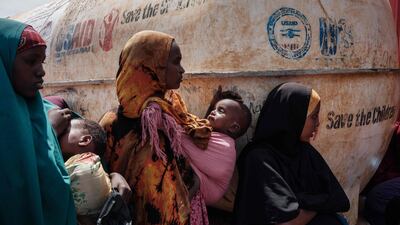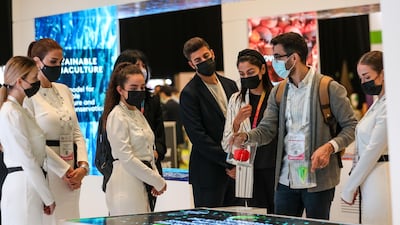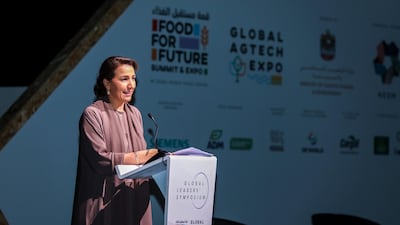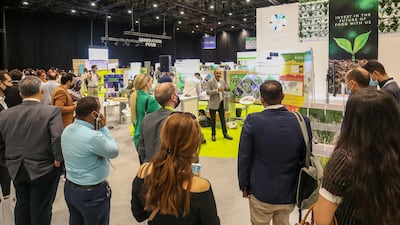Top officials and policymakers have urged governments to act, work together to strengthen global food security and defend the small farmer.
A global Food for Future summit at Expo 2020 Dubai trained the spotlight on how climate change affected agriculture and food systems, leading to hunger and poverty.
World leaders highlighted the critical need for innovative projects to support vulnerable communities and people living in poverty who do not have the resources to adapt to climate change.
Mariam Almheiri, Minister of Climate Change and Environment, spoke of the UAE’s role in building sustainable food systems.
global director for agriculture and food at the World Bank Group
“For the first time in the Mena region, we are coming together to initiate dialogue at all levels to accelerate the global transition towards sustainable food systems,” she said at a conference on Thursday.
Ms Almheiri spoke of exploring new solutions to address food security challenges and uniting “as one global community to achieve the 2030 Agenda for Sustainable Development”.
The summit comes as governments strive to address a looming agricultural shortfall to feed a global population that is likely to exceed 10 billion by 2050.
Ban Ki-moon, the former UN secretary general, warned that agricultural yields could decrease by 30 per cent if action was not taken in time.
“Supporting smallholder farmers is needed more than ever to address the growing population, the increase in demand for food, and to make food systems sustainable and resilient,” the ex-UN chief told delegates in a virtual address.
He spoke of the urgent need for a ‘people first’ approach as global smallholder farmers need an estimated $240 billion a year in finance support but received $10 billion in 2018.
Influential leaders stressed the need to optimise food production and reduce waste, and outlined the link between climate change and health.
Martien Van Nieuwkoop, global director for agriculture and food at the World Bank Group, warned the world was facing challenges of food insecurity, growing hunger and climate emergency.
“Governments need to fundamentally rethink their policies and put in place bold action,” he said.
“With one-third of all agricultural production lost to waste every year, equating to more than $1 trillion annually, we need to work seriously to address food production and waste. If this can be resolved, we would achieve a win-win situation of reducing greenhouse emissions while improving food security.”
He urged governments to go beyond a business-as-usual approach and instead implement food systems to support healthy people, the planet, and economies.
This was the first time in the Middle East and North Africa region that a government ministry had joined with a UN group such as the Food and Agriculture Organisation to bring regional and international experts together.
Abdul Hakim Elwaer, the organisation's assistant director general, said the transformation of agrifood systems — the chain from production to consumption — must be prioritised by harnessing digital technology to make food systems more sustainable.
“If we don’t address the soil, water and rivers properly, there will be no base for agriculture and no highly qualified agricultural raw materials,” he said. “That is why agrifood systems are very important for defining the future of humanity in the region.”





